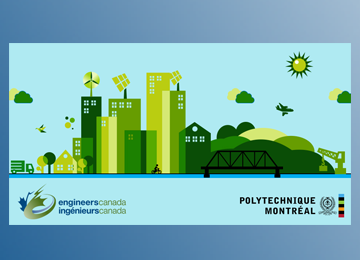
Engineers Canada and Polytechnique Montréal have partnered to launch “Sustainability in Practice,” a new massive open online course that will use real-life case studies from across Canada to demonstrate the practical application of Engineers Canada’s 10 guidelines on sustainable development and environmental stewardship for engineers.

Engineers Canada and Polytechnique Montréal have partnered to launch “Sustainability in Practice,” a new massive open online course that will use real-life case studies from across Canada to demonstrate the practical application of Engineers Canada’s 10 guidelines on sustainable development and environmental stewardship for engineers.
“Engineers have an important responsibility in building the world of tomorrow, and sustainable development and environmental stewardship must be integrated into a project from day one,” said Stephanie Price, P.Eng., CAE, Executive Vice-President, Regulatory Affairs at Engineers Canada. “Engineers Canada is excited to join forces with Polytechnique Montréal to present this online course that will give engineers and other professionals the tangible tools to do just that.”
Registration is now open, and the course begins on October 24, 2018. Hosted by Polytechnique Montréal on the EDUlib platform, the course is available in both English and French, and is to be completed online. Participation in the course is free of charge.
“Sustainability in Practice” is divided into four modules. Module one will review the major sustainability challenges that the world is currently facing and will present Engineers Canada’s 10 guidelines on sustainable development and environmental stewardship, as described in the National guideline on sustainable development and environmental stewardship for professional engineers.
In Module 2, course participants will hear from engineers who applied the principles of sustainable development and environmental stewardship in particular projects—from a mining project in the Arctic to building a bridge in a First Nations community in a remote area, to a foundry in industrial Montreal—and how they used certain tools and resources to evaluate sustainability outcomes, consult with the community, and seek and disseminate innovation.
Module 3 uses more case studies—including the challenges of installing a wind turbine in the Arctic, implementing an ecological corridor in a highly densified urban area, and how the city of Surrey is preparing for rising sea levels—to illustrate how to plan and manage risks for a changing world.
The fourth and final module reviews the 10 guidelines on sustainable development and environmental stewardship. The engineers who shared their experiences in Modules 2 and 3 will once again underscore the importance of implementing sustainability principles in practice.
Participants will be able to ask questions and discuss the course content in an online forum, which will be monitored by Polytechnique Montréal, with assistance from Engineers Canada. The course ends on December 21, 2018.
Intended for any practising engineer in Canada, regardless of their discipline or their position, whether as employees, employers, researchers, academics, consultants, regulators, or managers. Engineering students may also find the course to be of interest, as may professionals from other disciplines, including geoscientists, architects, or urban planners, among others.
To register for “Sustainability in Practice,” visit the EDUlib website.


